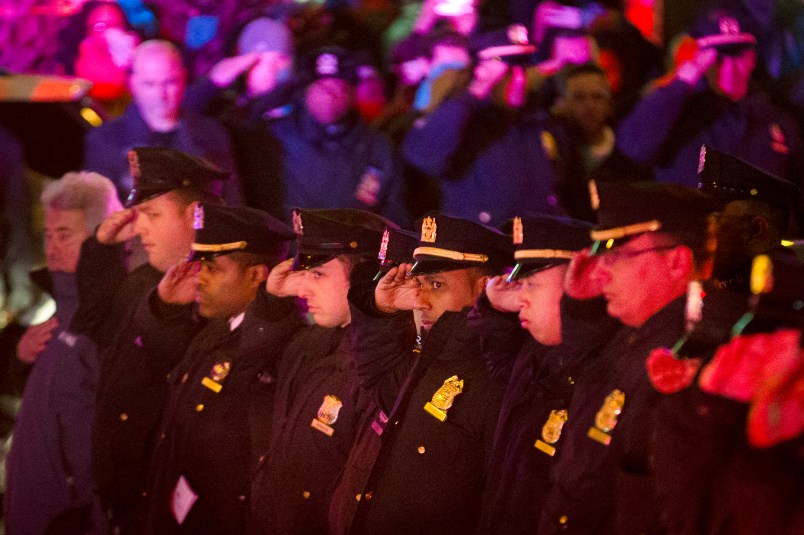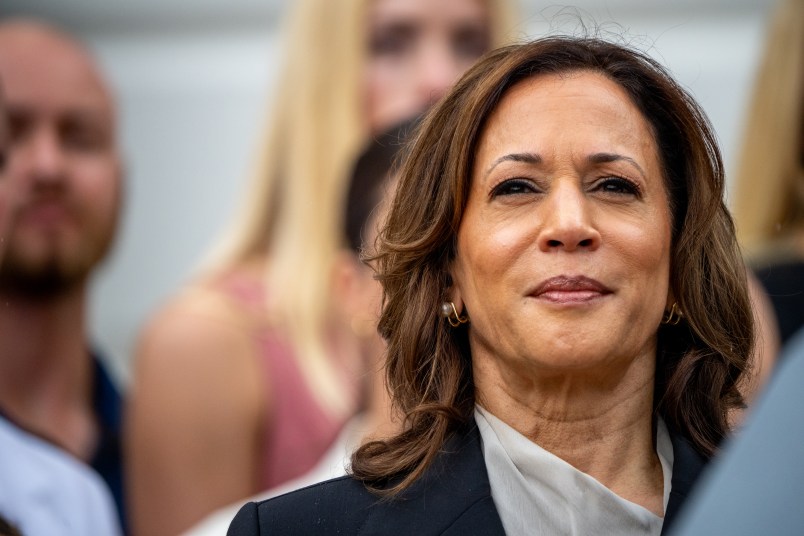A week ago I got an email from TPM Reader LC (not his actual initials, for reasons which will become clear). LC is a couple-decades-in police officer in the suburban New York area. He wanted to take issue with one of my points, a central point, in my post about Michael Brown from a few weeks ago: that Darren Wilson’s grand jury version of events simply wasn’t credible. I wanted to hear what LC had to say; I’ve wondered about my own contention about that. But one of the many things that made LC’s take especially interesting to me is that he’s a self-identified progressive Democrat, not only that but a longtime TPM Reader and even a Prime subscriber.
That interested me for a couple reasons. Cops obviously come in all races and all political persuasions. But on balance they lean heavily conservative, not necessarily on pocket book issues but on social and, for lack of a better phrase, law and order issues. The evidence for this is too voluminous to require discussion and probably not surprising to most people. So I was interested to hear more about what that’s like: being a cop and a liberal. But what interested me a lot more was an opportunity to challenge my own assumptions and get a deeper understanding of stuff – perceptions, values, etc. – that I don’t know enough about. To be specific, it allowed me – probably as much as is ever really possible – to get a perspective which separated out things that are inherent to police work from conservative values and political beliefs which are often overlaid on to them because of the demographics of the profession.
My assumptions, beliefs, attitudes towards police work are probably a bit different from what even a lot of readers would imagine. That’s one reason I’ve been as vocal as I have about the Pat Lynch comments. My attitudes toward police and policing are far from reflexively negative. Far from it actually. That’s part of why I’ve found Lynch’s comments so disturbing. To the extent he speaks for the rank and file NYPD, coupled with the back turning at the funeral of Officer Ramos, members of the NYPD seem to believe they are a law or constituency unto themselves. This is the point I tried to make in “Who Do You Work For?”
In one of the write-ups about the back-turning at the Ramos funeral, there was an interview with retired NYPD Officer John Mangan who held a sign that read: “God Bless the NYPD. Dump de Blasio.” My immediate thought was, what about the City of New York? What about the people of New York? Where do we fit into this equation?
Even Giuliani, who I obviously disagree with on many things and has been fairly toxic on the NYPD/de Blasio drama, thinks the back-turning was wrong.
So I wanted to know from LC what he thought of that post and just what I needed to know, what I was missing in general. He wrote me back a long email which I’m sharing here. We worked together to edit out some passages that were specific and personal enough that they could be used to identify who LC was. That removed a bit of the grit and detail and some illuminating references to social media posts by fellow officers. But not too much.
Here’s LC’s email. (The only thing I’ve altered are LC’s initials, which I did to ease identification in future posts.)
First off, a disclaimer. I’m not your typical cop. I’m a progressive Democrat. Rarely do I come across another in the department who shares my politics, and when I do, I liken it to discovering another member of the French Resistance. We keep our views to ourselves… though I have become more vocal in recent years. I once worked with a military vet for three years before I figured out he, too, was a Democrat. And I once had a conversation with a higher-ranking officer and the subject of NPR came up. We quickly came to the realization that we shared some political views he said to me, half-jokingly, “You keep my secret and I’ll keep yours”
As for Lynch, the city PBA President, Police Departments are paramilitary organizations, highly regulated, and Police Officers in general are highly circumscribed in how they can act and what they can say, at the risk insubordination and disciplinary action. The PBA President is in many ways their only public voice. And when they are angry, frustrated, and feel set upon by their political leaders, the union leader who fails to express that emotion is going to lose the respect of the rank and file. (Officers who speak out publicly against Department leaders have, in the past, been brought up on departmental disciplinary charges. Union leaders enjoy a certain amount of protection under labor laws.)
Lynch has a significant financial incentive to keep his job. According to IRS filings, in 2012 he received over $98K in reportable compensation from the PBA, that’s on top of his similar city salary (high-ranking union officials are on “full release” from their city jobs in order to devote all of their time to representing their membership – they receive a city paycheck, but don’t have to work a police job, and the pay provided by the PBA (and expense accounts, phone, vehicle) is above and beyond their city salary – so Lynch likely makes twice or more what a senior Police Officer takes home). Beyond his personal financial incentive to get re-elected, the PBA is currently beginning contract arbitration, and some of his histrionics can be attributed to political theater intended to influence the negotiating climate. His only constituency is his 24,000 members.
From personal experience, I know a little of internal police union politics – It can get ugly when the income stream and political power that union officials hold is threatened.
“Whites, Staten Islanders, and Republicans” may be a minority of New Yorkers, but that’s a good description of a large but shrinking bloc of the NYPD. (51% white as of June 2014) A police force that reflects the face of the city it protects can only be a good thing, in my opinion (see Ferguson, for example). But, like the aging white Republicans who rail against what they perceive as an interloper in the White House, some old school cops may fear the loss of their former Boys’ Club and mourn the disappearance of a department that looked like them. The siege mentality that animates the Tea Party national is alive and moving in Law Enforcement, which even under normal circumstances perceives the world as “us against them” – Police Officers, while in the Academy, are often advised that they will lose some friends, and find that their circle of friends will be more and more made up of others in the field. I came across this posting tonight, purportedly from an NYPD officer, and though I cannot vouch for its source, I have to say that every sentiment expressed rings true to me, although I don’t share them. It is worth a read. The closing of ranks when the Brotherhood is threatened is palpable.
I’ve been accused of being racist by African-American civilians just because of the color of my uniform. In one instance by an African-American ex-NYPD officer at a domestic incident. He spent 15 minutes interrupting me and claiming I was “only treating him that way” because he was black, while in reality I was treating him as I would any other person, based on his actions. I have close friends on the force, white, who are in interracial marriages, and on more than one occasion where they are accused of racism will pull out their wallet and show the accuser a picture of their wife and children. Are there cops with racist views? Of course. Do cops go out intending to kill people? No. They go out on patrol intending to come home to their families. I read recently that there are about 25 million interactions each year between the police and citizens in New York City. Statistically, bad things will happen. We can do our best to train and equip and sensitize officers to the community, but they are human, and not infallible. Nobody wants a bad actor in the ranks, it makes everyone’s job harder. We’re happy to see them go when they are found out.
Sharpton is anathema to the NYPD since the 1987 Tawana Brawley debacle and his habit of showing in front of cop’s suburban residences in protest after they were involved in shootings, even before his recent rhetoric. De Blasio’s close association with Sharpton during his campaign and subsequently sets a very bad precedent for his relations with the police. Sharpton is absolute poison to cops. A cop who was assigned to the detail at the 1991 rally where Sharpton was stabbed in assassination attempt, and had a hand in saving his life, told me it counts it as one of the mistakes of his career. That’s the feeling, and de Blasio’s association with Sharpton, while perhaps wise in the broader political sense, does him no good with the rank and file of the police department.
Even African-American police officers that I know have spoken out against Sharpton and his tactics, even referring to his tactics as “race-baiting.” The perception of Sharpton’s rhetoric as anti-police is not limited to white cops.
I don’t find Lynch’s comments shocking, given the environment he has to operate in. Though I think he was out of line with his comments at the hospital about blood on the hands of the mayor, it is incendiary – but it’s what’s expected of him – even if that rhetoric has the unintended effect of increasing the level of danger to the very people he represents. It’s red meat for the rank-and-file masses. This is the way politics is done these days, inside and outside of unions, and that speech probably clinched the PBA election for him. He is channeling the anger, and using it partially for his own benefit.
I have not been this upset since 9/11, when I lost a close friend, a city cop. It’s an emotional time, I feel the loss deeply. It’s senseless, and I do believe that some of the rhetoric contributed to it. There is a sense, too, that the protesters have crossed over the line of free speech. Free speech should not include the right to block traffic, or bridges – and there is a sense that de Blasio has allowed that. On-scene commanders seem to have allowed the acts of blocking traffic, normally an offense. But couple protests that skirt the edge of laws or break them and include incendiary rhetoric and anti-police sentiment, and the cops start to scratch their heads…
Who do cops work for? We try to be impartial. We uphold the constitution and the laws… so there is not a real sense that the police work for de Blasio or the People or the City Council or Bratton… the sense is that we enforce those laws that the people put in place. And when the politicians allow people to break those laws in the name of free speech, the cops feel betrayed. I get the reason behind civil disobedience, etc, but civil disobedience is normally undertaken at the risk of arrest. I think even the cops respect that… you want to make your point, you get carried to the paddy wagon. Point taken, with all due respect. But when that risk is taken away by a political decision not to arrest, the cops see a slippery slope to anarchy. (In New York, though, with few exceptions, its a credit to both the citizens and the police that we did not see another Ferguson. Let’s hope it stays that way.)








